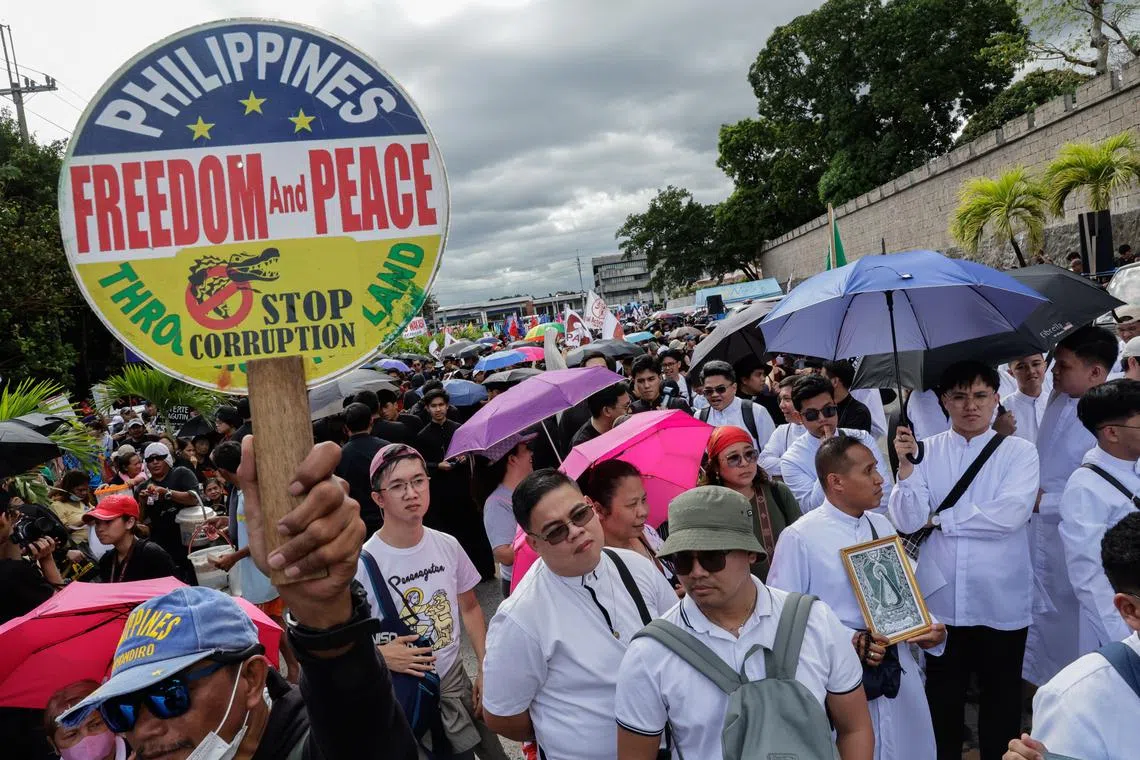‘No freedom without protest’: Filipinos defy Marcos’ snub of People Power anniversary
Sign up now: Get insights on Asia's fast-moving developments

A man waving the Philippine national flag during a demonstration commemorating the 39th anniversary of the People Power Revolution in Quezon City on Feb 25.
PHOTO: AFP
Follow topic:
MANILA – The Philippine capital’s busiest highway turned into a river of black shirts on Feb 25, as thousands of Filipinos took to the streets to mark 39 years since the People Power Revolution. The near-bloodless uprising in 1986 ousted the late dictator Ferdinand Marcos Sr, whose son now leads the nation.
For the second year in a row since he took office in June 2022,
Mr Marcos Sr’s rule – which included nine years of brutal martial law from 1972 to 1981 – was marred by massive corruption, media censorship, and the killings, torture and disappearances of government critics.
A series of non-violent demonstrations from Feb 22 to 25, 1986, as over two million Filipino civilians held peaceful protests, eventually led to the strongman’s ouster and restored democracy in the Philippines.
But 39 years later, the decision of his only son and namesake to designate the People Power anniversary as a “special non-working day” instead of a holiday has spurred opposition groups to organise a massive gathering to mark the date.
In a rare display of unity, Filipinos across the political spectrum – Catholic groups, members of the Liberal Party, left-leaning organisations and students – came together on Feb 25 to protest against what they perceived as efforts to revise history and reframe the roles of heroes and villains. As they gathered at the People Power Monument in Quezon City, north-east of Manila, they chanted: “Never forget, never again!”
Despite the day not being designated as a holiday, more than 50 schools and universities nationwide, most of them run by the Catholic Church, suspended classes on Feb 25 as their administration officials encouraged students to participate in the protest.

A demonstration commemorating the 39th anniversary of the People Power Revolution in Quezon City, north-east of Manila, on Feb 25.
PHOTO: EPA-EFE
Marketing-management undergraduate Gab Garces, 23, said he attended the gathering because he was inspired by his mother, who was a teenager when she joined the1986 street protests.
“I think it’s really important that we teach young people like me today that (the martial law years) actually happened, so that hopefully we can prevent that from happening all over again,” the first-year student at St Paul University Manila told The Straits Times.
Mr Garces, along with his course mates, bore placards that read: “There’s no freedom without protest” and “Marcos not a hero”.
Filipino historian Xiao Chua told ST: “This is an event where you can see how the efforts to minimise the significance of People Power day as a working holiday actually works against the Marcos Jr administration. Because now, people are finding more reasons to celebrate it.”
The Marcos family has to date not apologised for the atrocities committed when the family patriarch was at the helm.
Decades after the family fled the Philippines in disgrace in 1986, Filipino political analysts and historians have reported a rise in online efforts to reframe Mr Marcos Sr’s presidency. This includes disinformation attempts on social media to whitewash abuses during the dictator’s martial law years, coupled with targeted attacks against the clan’s political opponents, according to a 2022 study by researchers at the Philippine Media Monitoring Laboratory.
The Marcoses have since successfully returned to Philippine politics, securing plum posts in government. The clan and its allies have also been winning their ill-gotten wealth cases in local courts, securing at least eight legal victories since Mr Marcos Jr became president in 2022.
The President’s sister Imee Marcos is an incumbent senator, House Speaker Martin Romualdez is his cousin, and his son Sandro Marcos is the Ilocos Norte Representative.

(Clockwise from top left) Philippine President Ferdinand Marcos Jr; his sister Imee Marcos; his cousin Martin Romualdez; and his son Sandro Marcos.
PHOTOS: EPA-EFE, REUTERS, AFP
“Definitely, there is an active effort to whitewash the martial law years,” political analyst Jean Encinas-Franco of the University of the Philippines told ST. “I think this makes it even more important that we resist this administration’s efforts to revise history”.
Several groups also used the People Power anniversary gathering to put pressure on the Philippine Senate to start the trial of impeached Vice-President Sara Duterte,
The House of Representatives, dominated by allies of Mr Marcos Jr, impeached Ms Duterte on Feb 5 for her assassination threat against the President and for allegedly misusing millions in public funds.
Activist-priest Father Robert Reyes said that demanding accountability from the government today keeps the spirit of People Power alive.
“The elder Marcos ruled for 20 years because there was impunity. So today, we are challenged to hold our erring public officials accountable,” he told ST. “Accountability is such an essential principle of democracy”.


